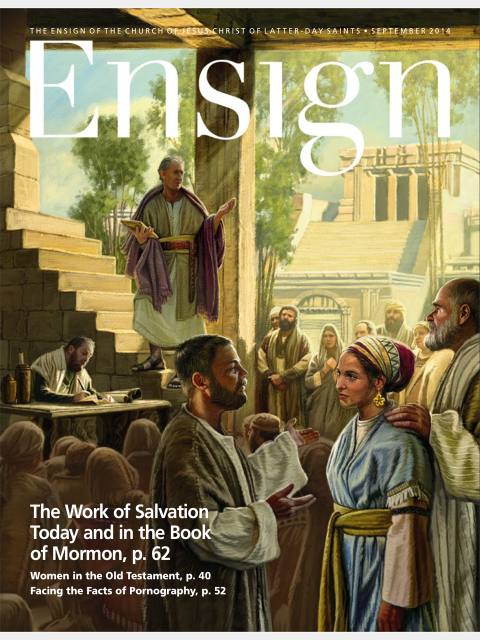 This month’s Ensign features an article by Elder M. Russell Ballard on “Men and Women and Priesthood Power,” which gives his perspective on the “essential role women have in strengthening and building up the kingdom of God on the earth.”
This month’s Ensign features an article by Elder M. Russell Ballard on “Men and Women and Priesthood Power,” which gives his perspective on the “essential role women have in strengthening and building up the kingdom of God on the earth.”
Some portions of it made me heartsick, partly because the article rehearses the same tired “separate spheres” arguments that became standard fare in Mormonism in the twentieth century, and partly because it came from Elder Ballard, who a couple of years ago mailed me a signed copy of one of his books, personalized and inscribed and entirely out of the blue. He did not have to do that. He said he sent it because he’d read about my testimony and thought I would enjoy it. I did, and was very touched by his kindness.
Through his talks I have come to love and respect the man, but I am saddened by this Ensign article, which apparently is based on a BYU talk Elder Ballard gave in August 2013. Some parts are very affirming, like when he points to the love that Heavenly Father has for all of his children, male and female. But I found other points less helpful.
Here are three “takeaways” for readers.
1) Women have a role to play in ward council, but in a strictly advisory capacity. After instructing men about the need to “include sister leaders in full partnership in ward and stake councils” – a commendable step forward — Elder Ballard addresses women directly:
Now, sisters, while your input is significant and welcome in effective councils, you need to be careful not to assume a role that is not yours. The most successful ward and stake councils are those in which priesthood leaders trust their sister leaders and encourage them to contribute to the discussions and in which sister leaders fully respect and sustain the decisions of the council made under the direction of priesthood leaders who hold keys.
Here’s what this sounds like to my ears: “Sisters, submit your opinion at times for consideration and then just submit, period, because whatever decision is at hand is not yours to make. Don’t overstep the bounds the priesthood has graciously allowed you.”
2) Equality is not sameness. Neither gender is more important than the other, says the apostle; both are equally vital to the plan of God. (Amen to that.) However, both men and women have different roles. Women have “unique spiritual gifts” that are in play especially in their own families and in raising their children.
Men, apparently, have the gift for doing everything else.
3) If you don’t agree that this is what equality looks like, you’re not thinking straight. It’s all too easy to be persuaded by worldly understandings of equality. Elder Ballard expresses his sadness, for example, that reporters who cover the Church would infer that women’s minuscule role in decision-making means they are “second-class citizens” in the Mormon community. “Nothing could be further from the truth,” he assures us.
But while the article does a fine job of demonstrating the theological equality that men and women enjoy in eternity and in the eyes of God, I didn’t anywhere see evidence that we are doing more than paying lip service to women as equals in the concrete practices of today’s Church.
It’s clear from the picture Elder Ballard paints of ward councils that while many words of value might be applied to women there – assistant, helper, supporter, or deputy, for example – “equal” is not among them.
I’m saddened by these three points, but even more by the closing warning in which Elder Ballard counsels us specifically not to seek to improve women’s standing within the Church’s earthly organization, which he equates with God’s plan:
Do not spend time trying to overhaul or adjust God’s plan. We do not have time for that. It is a pointless exercise to try to determine how to organize the Lord’s Church differently.
I don’t find such discussion pointless at all. It’s clear that many members of the Church feel passionate enough about this issue that if we “do not have the time” for conversations about women’s equality, then we need to make the time or we will lose beloved Saints.
Never miss a blog post: Sign up via the red “subscribe” button at the top right to receive email alerts whenever there’s new content on the blog.





